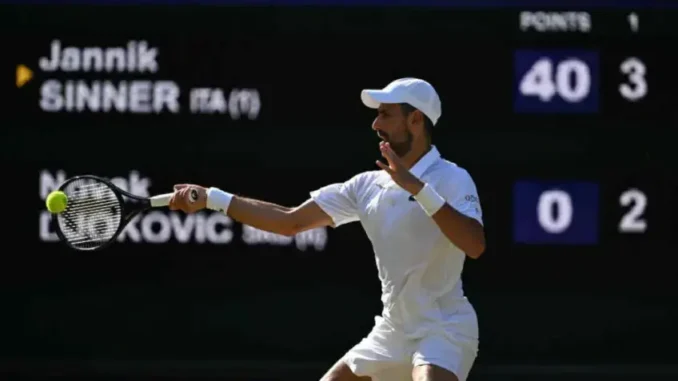
Novak Djokovic, Serbia’s most celebrated athlete, has once again found himself at the heart of a national controversy, this time escalating tensions with the country’s leadership and igniting a firestorm of debate. The 24-time Grand Slam champion, revered as a symbol of Serbian resilience and pride, has become a polarizing figure in his homeland, caught in a clash between his support for a burgeoning protest movement and the government’s nationalist agenda. As the world No. 1 prepares for the Cincinnati Open, his actions off the court have sparked a narrative that transcends sport, blending personal conviction, political defiance, and national identity.
The saga began when Djokovic publicly endorsed a student-led protest movement in Serbia, which has been gaining momentum against President Aleksandar Vučić’s administration. The protests, driven by demands for greater democratic freedoms and transparency, have struck a nerve in a nation still grappling with the legacies of the 1990s Balkan conflicts. Djokovic, who has long been a beacon of Serbian success, took to social media to express solidarity with the demonstrators, a move that drew both admiration and ire. “I feel the obligation to show support for our people,” he stated, echoing sentiments he voiced during a 2023 French Open controversy when he wrote “Kosovo is the heart of Serbia” on a camera lens, a statement that stirred tensions with Kosovo’s tennis federation.
This latest act of defiance has painted Djokovic as a traitor in the eyes of some government-aligned media outlets, which have launched a smear campaign accusing him of siding with “violent agitators.” Posts circulating on platforms like X have highlighted the escalating rift, with one describing Djokovic as “escalating tensions with Vučić by supporting student protests and moving a tournament from Belgrade to Greece.” The relocation of the Serbia Open, a tournament run by Djokovic’s family, to Greece has been particularly contentious, interpreted by critics as a snub to Serbian national interests. The move follows years of controversy surrounding the tournament, including a 2013 lease dispute in Belgrade and a 2023 relocation to Bosnia’s Republika Srpska, which raised questions about transparency and legality.
Djokovic’s history of engaging with sensitive political issues is not new. In 2022, his deportation from Australia over his unvaccinated status became a national cause in Serbia, with President Vučić decrying the treatment as a “witch hunt” and accusing Australian authorities of “humiliating” the tennis star. “They think they humiliated Djokovic with this 10-day harassment, but they actually humiliated themselves,” Vučić said at the time. The saga saw Djokovic’s family rally behind him, with his father, Srdjan, calling it an “assassination attempt on the world’s best athlete.” The outpouring of support from Serbian fans, who mobbed Melbourne streets chanting “Free Novak,” underscored his near-mythic status as a national hero.
Yet, Djokovic’s recent actions have fractured that unity. His support for the protests has drawn sharp rebukes from nationalist factions, who see him as betraying the very identity he once embodied. A Belgrade mural depicting Djokovic alongside the late Serbian Orthodox Patriarch Pavle speaks to his once-unassailable status, but now, some view his activism as a challenge to the state’s authority. “He’s fighting for himself, his people, and all freedom-loving nations,” Srdjan Djokovic once declared, a sentiment that resonates with supporters who see Novak as a champion of justice. However, critics argue his actions risk destabilizing an already polarized nation, with one Serbian politician labeling him a “public figure legitimizing dangerous ideologies.”
Djokovic’s global influence amplifies the stakes. As the founder of the Professional Tennis Players Association and the Novak Djokovic Foundation, which supports disadvantaged children, he has long leveraged his platform for advocacy. His 2010 Davis Cup triumph and 2024 Olympic gold medal cemented his role as Serbia’s sporting ambassador, yet his outspokenness—whether on Kosovo, vaccinations, or now protests—has made him a lightning rod. “I am against wars, violence, and any kind of conflict,” he said in 2023, defending his Kosovo stance while emphasizing peace. This duality—advocating for unity while wading into divisive issues—defines his complex legacy.
As Serbia navigates this national case, Djokovic remains a figure of immense pride and contention. His support for the protests, coupled with the tournament’s relocation, has cast him as both a hero and a pariah. With the tennis world watching, the question looms: can Djokovic balance his role as a global icon with the weight of a nation’s expectations?
Leave a Reply